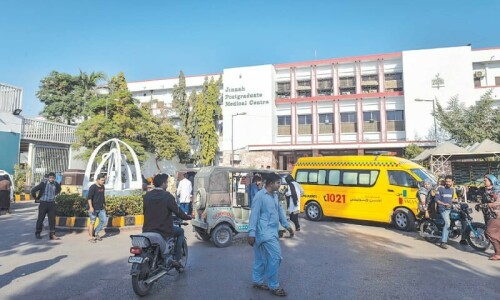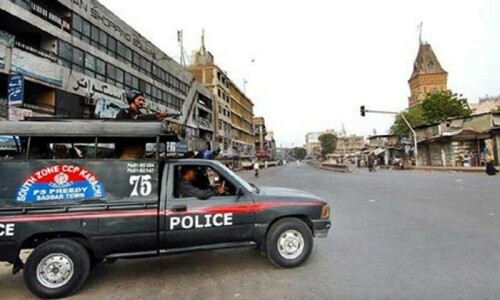KARACHI: Speakers at a seminar on Monday highlighted the significance of DNA evaluation across the globe and how it revolutionised the forensic sciences by offering conclusive evidence to investigators.
The seminar — DNA: evaluation of forensic evidence — was organised by the Dow University of Health Sciences (DUHS) at its professional development centre.
DUHS Vice Chancellor Prof Saeed Quraishy stressed the need for taking maximum benefit of such sessions.
Prof Farhat Mirza, chairman of the forensic medicine department at Jinnah Sindh Medical University, discussed the ethical aspects regarding the collection, preservation and dispatch of forensic evidence for a DNA analysis.
He said such state-of-the-art facilities should have been in abundance in a cosmopolitan city like Karachi keeping in mind the fact that the crime rate was rising while there were few resources to tackle crime. “The world is fully taking benefit of such scientific miracles, and we should not keep ourselves behind.”
Dr Nuzhat Akram, a member of the International Society of Forensic Genetics, in her presentation gave a detailed view of DNA markers that were being used across the world for identification purpose.
Elaborating her point, she said the reliability of DNA evidence for medico-legal purposes could only be enhanced by using meticulous techniques and procedures for collection, preservation, handling, transportation and testing biological samples.
Prof Mukkaram Ali of the Dow University Hospital informed the audience that the country was seriously lacking effective medico-legal services.
‘Forensic labs needed in all cities’
He said forensic laboratories should be set up in all the cities of the country as that could fortify the existing weak medico-legal system that largely failed to support the criminal justice system.
DUHS Pro-VC Prof Khawar Saeed Jamali appreciated the organisers for holding the seminar.
Dr Ramlah Naz, who headed the forensic medicine department at Dow Medical College, said forensic medicine was a branch of basic sciences and had been denied due importance for decades.
She said such programmes would help give due status to a neglected sector which, otherwise, had great value in providing justice to victims of crime.
She said the country needed huge investment in a science which could help improve the justice system, saving the innocent and punishing the culprits.
Later, the house was declared open for discussion during which medico-legal officers expressed their concerns over various aspects.
They generally complained they did not have access to crime scenes and evidence found there; thus, they had to rely on whatever was brought to them.
They said due to lack of modern forensic facilities and appropriate training programmes the medico-legal system routinely encountered problems.
Published in Dawn, May 23rd, 2017













































Dear visitor, the comments section is undergoing an overhaul and will return soon.